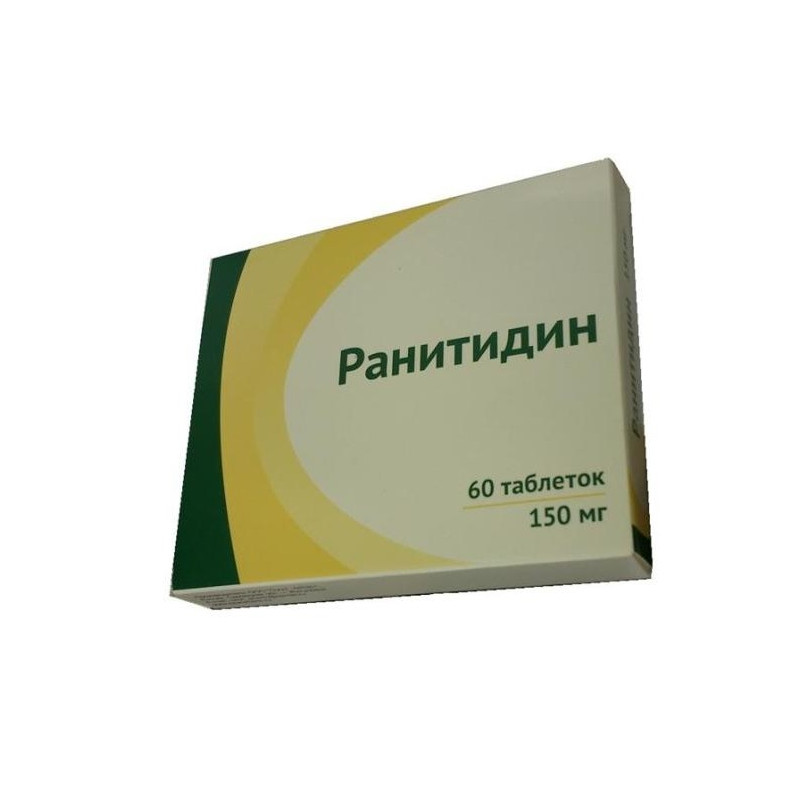



 All payments are encrypted via SSL
All payments are encrypted via SSL
 Full Refund if you haven't received your order
Full Refund if you haven't received your order
1 pill contains the active substance: ranitidine hydrochloride - 168 mg, in terms of ranitidine - 150 mg
Stomach glands secretion lowering means - H2-histamine receptor blocker
Ranitidine is an antagonist of histamine H2 receptors of the parietal cells of the gastric mucosa. Reduces the basal and stimulated secretion of hydrochloric acid, caused by irritation of the baroreceptors, food load, the action of hormones and biogenic stimulants (gastrin, histamine, pentagastrin). Ranitidine reduces the volume of gastric juice and the content of hydrochloric acid in it, increases the pH of the stomach contents, which leads to a decrease in the activity of pepsin. After oral administration in therapeutic doses does not affect the level of prolactin. Inhibits microsomal enzymes. Duration of action after a single dose of up to 12 hours.
Treatment and prevention of exacerbations of gastric ulcer and duodenal ulcer; gastric and duodenal ulcers associated with nonsteroidal anti-inflammatory drugs (NSAIDs); reflux esophagitis, erosive esophagitis; Zollinger-Ellison syndrome; treatment and prevention of postoperative,"Stressful" ulcers of the upper gastrointestinal tract; prevention of recurrence of bleeding from the upper gastrointestinal tract; prevention of gastric juice aspiration during operations under general anesthesia (Mendelssohn's syndrome).
Hypersensitivity to ranitidine or other components of the drug. Pregnancy, lactation. Children's age up to 12 years. With care - renal and / or hepatic failure, cirrhosis of the liver with a history of portosystemic encephalopathy, acute porphyria (including a history), immunosuppression.
Ranitidine is taken, regardless of the meal, without chewing, with a small amount of liquid. Adults and children over 12 years: Peptic ulcer and 12 duodenal ulcer. For the treatment of exacerbations prescribed at 0.15 g, 2 times a day (morning and evening) or 0.3 g at night. If necessary, 0.3 g 2 times a day. The duration of treatment is 4 to 8 weeks. For the prevention of exacerbations appoint 0.15 g per night. Ulcers associated with the intake of NSAIDs. Assign 0.15 g 2 times a day or 0.3 g per night for 8-12 weeks. Prevention of ulceration when taking NSAIDs - 0.15 g, 2 times a day. Postoperative "stress" ulcers. Assign 0.15 g 2 times a day for 4-8 weeks. Reflux esophagitis, erosive esophagitis. Assign 0.15 g 2 times a day or 0.3 g per night. If necessary, the dose can be increased to 0.15 g 4 times a day. The course of treatment is 8-12 weeks. Zollinger-Ellison syndrome.The initial dose is 0.15 g 3 times a day, if necessary, the dose can be increased. Prevention of recurrent bleeding. At 0.15 g, 2 times a day. Prevention of the development of Mendelssohn's syndrome. Assign a dose of 0.15 g for 2 hours before anesthesia, and preferably 0.15 g the previous evening. In the presence of concomitant abnormal liver function, a dose reduction may be required. Patients with renal insufficiency with creatine clearance less than 50 ml / min, the recommended dose is 0.15 g per day. Patients on hemodialysis, the next dose is prescribed immediately after hemodialysis.
